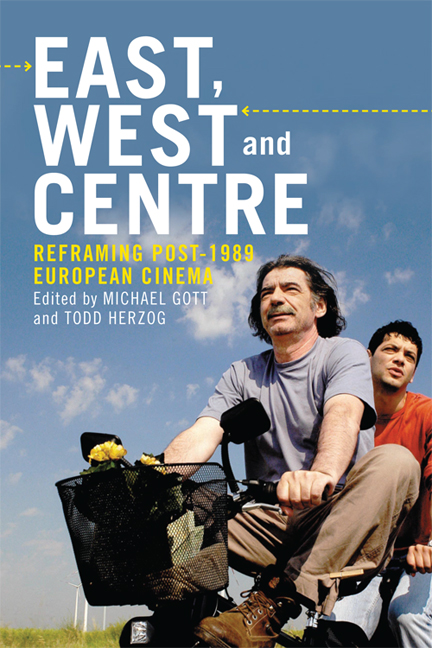Book contents
- Frontmatter
- Contents
- List of Figures
- Notes on Contributors
- Acknowledgements
- Introduction: East, West and Centre: ‘Mapping Post-1989 European Cinema’
- Part I Redrawing the Lines: De/Recentring Europe
- 1 The Berlin Wall Revisited: Reframing Historical Space between East and West in Cynthia Beatts's Cycling the Frame (1988), The Invisible Frame (2009) and Bartosz Konopka's Rabbit à la Berlin (2009)
- 2 Changing Sides: East/West Travesties in Lionel Baier's Comme des voleurs (à l'est)
- 3 Dubbing and Doubling Over: The Disorientation of France in the Films of Michael Haneke and Krzysztof Kieślowski
- 4 Challenging the East–West Divide in Ulrich Seidl's Import Export (2007)
- 5 Fatih Akın's Filmic Visions of a New Europe: Spatial and Aural Constructions of Europe in Im Juli/In July (2000
- 6 Salami Aleikum – The ‘Near East’ Meets the ‘Middle East’ in Europe
- 7 Cinematic Fairy Tales of Female Mobility in Post-Wall Europe: Hanna v. Mona
- Part II Border Spaces, Eastern Margins and Eastern Markets: Belonging and the Road to/from Europe
- Part III Spectres of the East
- Notes
- Bibliography
- Index
3 - Dubbing and Doubling Over: The Disorientation of France in the Films of Michael Haneke and Krzysztof Kieślowski
from Part I - Redrawing the Lines: De/Recentring Europe
Published online by Cambridge University Press: 05 September 2016
- Frontmatter
- Contents
- List of Figures
- Notes on Contributors
- Acknowledgements
- Introduction: East, West and Centre: ‘Mapping Post-1989 European Cinema’
- Part I Redrawing the Lines: De/Recentring Europe
- 1 The Berlin Wall Revisited: Reframing Historical Space between East and West in Cynthia Beatts's Cycling the Frame (1988), The Invisible Frame (2009) and Bartosz Konopka's Rabbit à la Berlin (2009)
- 2 Changing Sides: East/West Travesties in Lionel Baier's Comme des voleurs (à l'est)
- 3 Dubbing and Doubling Over: The Disorientation of France in the Films of Michael Haneke and Krzysztof Kieślowski
- 4 Challenging the East–West Divide in Ulrich Seidl's Import Export (2007)
- 5 Fatih Akın's Filmic Visions of a New Europe: Spatial and Aural Constructions of Europe in Im Juli/In July (2000
- 6 Salami Aleikum – The ‘Near East’ Meets the ‘Middle East’ in Europe
- 7 Cinematic Fairy Tales of Female Mobility in Post-Wall Europe: Hanna v. Mona
- Part II Border Spaces, Eastern Margins and Eastern Markets: Belonging and the Road to/from Europe
- Part III Spectres of the East
- Notes
- Bibliography
- Index
Summary
In an early scene from Krzysztof Kieślowski's Blanc White (1993, Poland/ France/Switzerland) a Polish immigrant struggles to defend himself in a Parisian courtroom despite his lack of competence in French. Karol Karol speaks hastily to the judge, imploring him to listen to his side of the story before granting his wife a divorce: ‘Where is equality? Is my not speaking French a reason for the court to refuse to hear my case?’ His translator renders these comments in French but Karol's wife declares that she no longer loves him and the unconsummated marriage is annulled.
It hardly seems surprising that a film by a Polish director whose opening scenes take place in France should explicitly evoke the question of language. What Kieślowski succeeds in doing so brilliantly in this film, as in others, is engage with more than one tongue. French may be the language of the courtroom at the outset but it is not the language that dominates throughout the script. Kieślowski creates a complex text in which Polish is also portrayed as a language of law and power, thanks to the transnational, cross-cultural movements of Karol and the two other principal protagonists, his French ex-wife Dominique and his countryman Mikolaj. It is thanks to the latter that a dejected and destitute Karol is able to leave Paris and rebuild his life in a post-1989 Poland. The bilingual nature of this cinematic production means that, unless the protagonists are proficient in both French and Polish, a certain form of translation is necessary. The various characters in the film are not entirely autonomous, therefore, because they must often rely on others to communicate for them, like Karol Karol before the judge.
In an earlier film by Kieślowski, La Double vie de Veronique/The Double Life of Veronique (1991, Poland/France), relying on another to speak on one's behalf is necessary in a very literal sense, not simply for the advancement of the plot. The actress Irene Jacob plays two roles in this movie, that of the eponymous French music teacher and that of a Polish soprano whose name is the same in translation, Weronika. Since the actress is not the film to work.
- Type
- Chapter
- Information
- East, West and CentreReframing post-1989 European Cinema, pp. 51 - 64Publisher: Edinburgh University PressPrint publication year: 2014

